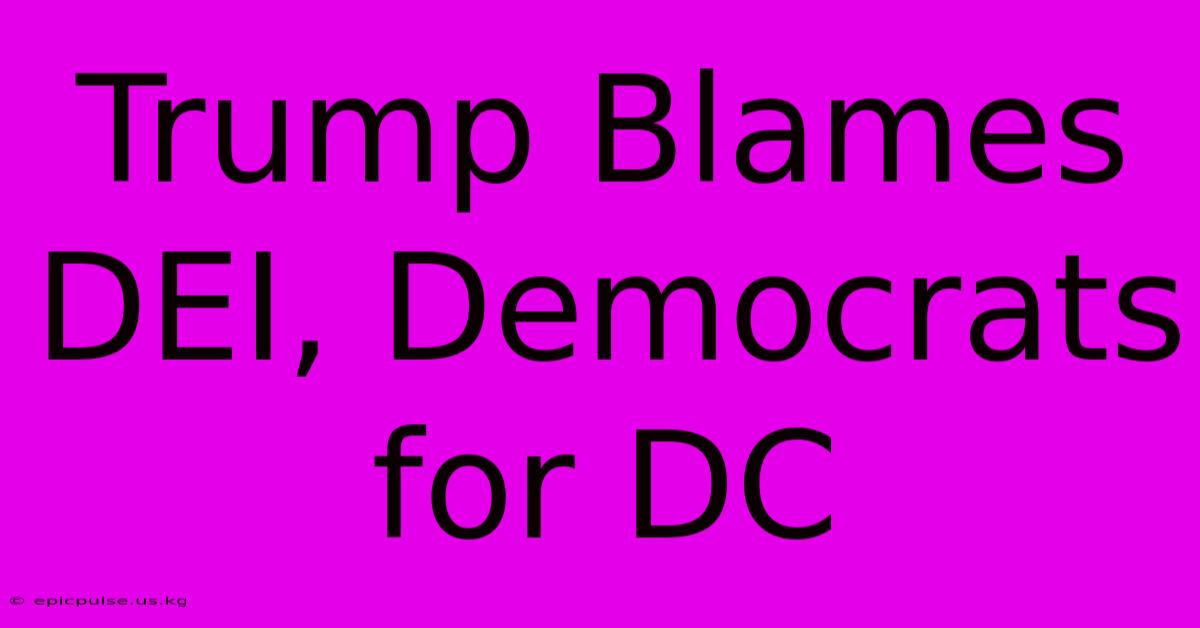Trump Blames DEI, Democrats For DC

Discover more detailed and exciting information on our website. Click the link below to start your adventure: Visit Best Website epicpulse.us.kg. Don't miss out!
Table of Contents
Trump Blames DEI, Democrats for DC's Woes: A Deep Dive into the Rhetoric and Reality
Donald Trump's frequent criticisms of Washington D.C., often interwoven with attacks on Diversity, Equity, and Inclusion (DEI) initiatives and the Democratic Party, have become a staple of his political rhetoric. But how much truth underlies these accusations? This article will delve into Trump's claims, analyzing the evidence and context surrounding his pronouncements, and exploring the complex realities of the nation's capital.
The Core of Trump's Argument: DEI and Democratic Mismanagement
Trump consistently frames Washington D.C.'s problems – from crime rates to homelessness – as direct consequences of Democratic leadership and the implementation of DEI programs. He argues that these initiatives prioritize identity politics over meritocracy, leading to inefficiency and a decline in public services. His rhetoric often paints a picture of a city overrun by unchecked progressive policies, resulting in a dangerous and dysfunctional environment.
Specific Claims and Their Scrutiny
Trump’s statements often lack specific data or evidence. While he frequently points to rising crime rates and homelessness in D.C. as examples of Democratic failures, he rarely provides a detailed analysis comparing these statistics to other major cities with different governing structures or policies. It's crucial to analyze the complex factors contributing to these issues, rather than attributing them solely to DEI initiatives or Democratic governance.
For instance, while crime rates have fluctuated in D.C., attributing this solely to DEI initiatives ignores other contributing factors such as socioeconomic disparities, historical inequalities, and national trends in crime rates. Similarly, homelessness is a multifaceted issue influenced by affordable housing shortages, mental health crises, and substance abuse, not simply a reflection of political ideology.
The DEI Debate: Merit vs. Representation
Trump’s criticisms of DEI programs frequently center on the idea that they undermine meritocracy. He argues that these programs prioritize hiring and promoting individuals based on race and gender over qualifications and experience.
This viewpoint ignores the nuances of DEI. While aiming for equitable representation, many DEI programs also emphasize merit-based selection. The goal isn't to replace qualified individuals but to create a more inclusive environment where qualified individuals from underrepresented groups have a fair chance to compete. Furthermore, a diverse workforce often brings a wider range of perspectives and skills, potentially improving decision-making and problem-solving.
The Democratic Party's Role in D.C. Governance
Washington D.C. has been predominantly governed by Democrats for decades. Trump uses this fact to link the city's challenges directly to Democratic policies. However, attributing all problems to one political party ignores the complexity of urban governance. Many factors influence a city's trajectory, including national economic trends, demographic shifts, and historical factors.
Furthermore, the Democratic Party itself is diverse, encompassing a range of political views and policy preferences. Attributing all policy decisions to a single, homogenous ideology is an oversimplification. Analyzing the specific policies enacted and their impact requires a nuanced understanding of the political landscape and the variety of factors affecting D.C.
Beyond Rhetoric: Examining the Data
To fully assess Trump's claims, it's essential to analyze specific data related to D.C.'s challenges. This involves comparing D.C.'s statistics to other major cities, considering national trends, and examining the impact of specific policies.
For example, analyzing crime statistics requires considering factors like policing strategies, socioeconomic conditions, and the availability of social services. Similarly, analyzing homelessness requires examining factors like affordable housing availability, access to mental health care, and the effectiveness of existing social programs. Simply comparing D.C.'s numbers to other cities without considering these contextual factors provides an incomplete picture.
The Need for Contextual Analysis
Any analysis of D.C.'s issues must consider the city's unique historical context and its distinct challenges. As the nation's capital, D.C. faces unique pressures and responsibilities. Its political environment differs significantly from other major cities, influencing policy-making and resource allocation. Understanding these nuances is crucial to avoid making simplistic causal attributions.
Counterarguments and Alternative Perspectives
Many experts and policymakers offer alternative explanations for D.C.'s challenges, emphasizing factors beyond DEI initiatives and Democratic governance. These explanations often involve complex interactions between socioeconomic inequalities, historical injustices, and national policy trends.
For example, some argue that the high cost of living in D.C. contributes significantly to both homelessness and crime. Others point to systemic inequalities that have disproportionately affected certain communities within the city. These factors require careful consideration when evaluating the effectiveness of current policies and exploring potential solutions.
Conclusion: Nuance and Responsibility in Political Discourse
Trump's criticisms of D.C., while often politically charged, highlight legitimate concerns about urban governance and the effectiveness of public policies. However, attributing all problems solely to DEI initiatives and the Democratic Party is a simplification that ignores the complex reality of governing a major city. A responsible and productive discussion necessitates a nuanced approach that considers all contributing factors, avoids oversimplification, and analyzes data objectively. It requires moving beyond partisan rhetoric to address the underlying challenges facing Washington D.C. and other urban centers across the nation. Only then can we hope to develop effective solutions that address the needs of all residents.

Thank you for visiting our website wich cover about Trump Blames DEI, Democrats For DC. We hope the information provided has been useful to you. Feel free to contact us if you have any questions or need further assistance. See you next time and dont miss to bookmark.
Also read the following articles
| Article Title | Date |
|---|---|
| Marianne Faithfull Singer Actress Icon | Feb 01, 2025 |
| Justin Tucker Responds To Misconduct Accusations | Feb 01, 2025 |
| Singer Marianne Faithfull Passes Away | Feb 01, 2025 |
| American Airlines Crash Washington Dc Details | Feb 01, 2025 |
| Fcsb Manchester United Europa League Live Score | Feb 01, 2025 |
